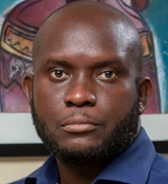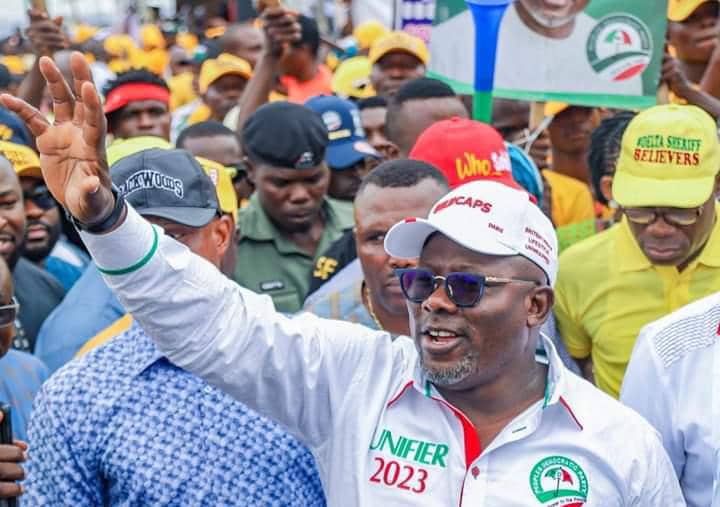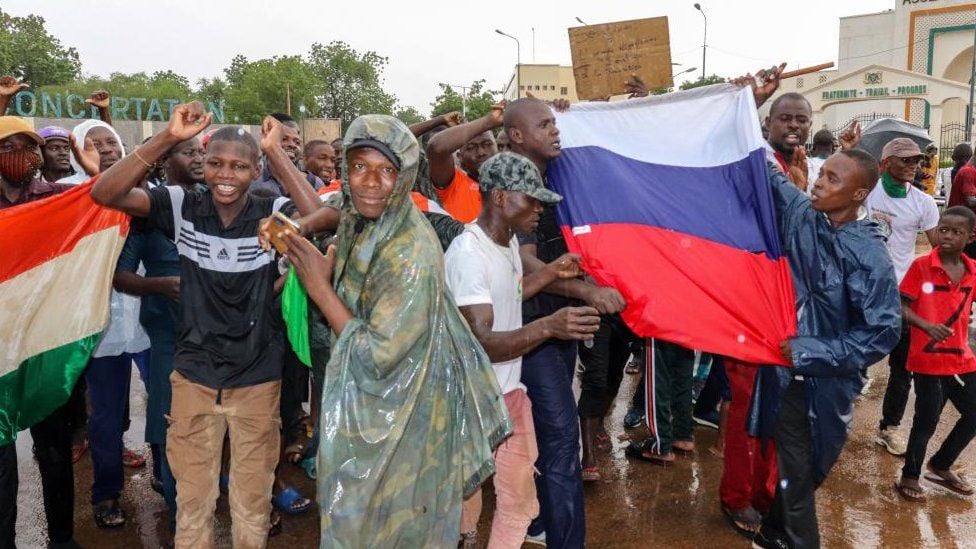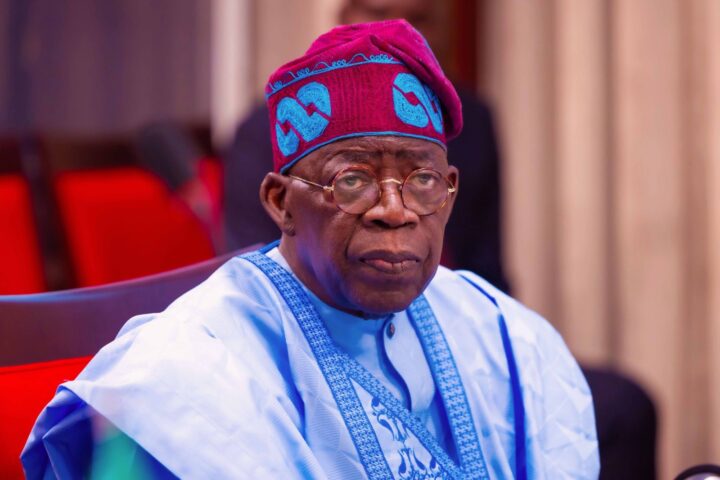How do you maximise the current capacities and potentials of a state that is a historical international economic location, with considerable petroleum production activities, two functional airports, four maritime ports and very skilled people? The answer to that may rest in the governance and economic philosophy of Rt. Hon. Sheriff Francis Orohwedor Oborevwori, the new Governor of Delta State, in Nigeria’s Niger Delta region. The vision of his administration, which indicates where he intends Delta state to be in a couple of years, and his mission, which spells out the governance approach to actualize his vision, are primers to what Delta state can achieve, with the Governor popularly known by his first name, Sheriff.
Governor Sheriff unveiled his M.O.R.E Agenda prior to his assumption of office as the 11th Governor of Delta State on May 29, 2023 election. It is an agenda that is designed to ensure progressive continuity in governance, built on Meaningful development; Opportunity for all Deltans, Realistic reforms; and Enhanced peace and security in the state (M.O.R.E). In the time since the unveiling of the M.O.R.E agenda, there have however been socioeconomic changes in Nigeria, that necessitates some upscaling of policies and plans. They include new laws on electricity and railways that allow state governments play roles, monetary and fiscal policies on foreign exchange, petroleum pricing and the petroleum sector. And this is a trajectory that will most likely continue, due to economic pressures and need for reform in Nigeria.
‘Sheriffnomics’ is therefore an expanded economic philosophy and worldview to be driven by Governor Sheriff, that harnesses the petroleum, maritime, industrial and real estate sectors and potentials of Delta state, to reposition the state as a major player in the international scene. This aligns with the development objectives of M.O.R.E. The socioeconomic changes in Nigeria, though challenging, provide an opportunity for states such as Delta, to positively modify governance plans, and maximize the opportunities that are inherent in these changes.
What then are the details of Sheriffnomics?
Advertisement
First, the petroleum sector. Due to insecurity and other factors, the leading multinational oil corporations such as Shell, ENI/Agip and Exxon-Mobil decided over ten years ago to divest from onshore petroleum assets and projects in Nigeria. This decision contributed to a decline in the economy, industrial and investment appeal of Delta state, as well as the derivation earnings of the state. However, the rising challenge to energy security in many Western countries where these companies originate from, due to Russian activities in Ukraine and Europe, has opened up opportunities for the possible return of these major energy companies to Delta state. European Union (EU) officials have in the recent past visited Nigeria, to identify opportunities and means through which Nigeria can increase the supply of petroleum products to Europe. With petroleum gas being an energy source of EU interest, this renewed interest should make the Delta Gas City project/Gas Revolution Industry Park (GRID) an attractive investment.
As the activities of government and private security companies have enhanced security and protection of society and onshore petroleum infrastructure, the timing is therefore appropriate for Governor Sherriff and Delta state to embark on international charm offensive, to woo these multinationals back to Delta state. This mutually beneficial proposition not only presents European countries with more energy security, but also translates into more investment and derivation earnings for the state. It is not envisaged to be an easy endeavour, but Governor Sheriff can draw lessons from experiences of former President Obasanjo, who upon return as President in 1999, sought international lifting of sanctions and debt relief, for Nigeria. Success for Obasanjo in these international negotiations came with the involvement of Nigeria international human capital such as Ngozi Okonjo-Iweala, who coincidentally has natal origins in Delta state. This also raises the need for economic envoys or covert Sheriffnomics ambassadors, which we will return to. Part of the domestic angle for the petroleum sector will be the provision of support and encouragement towards the construction of the Aiteo Group 100,000-barrel refinery in Warri, especially as the Petroleum Industry Act 2021 and presidential implementation, have fully deregulated the Nigerian petroleum industry for market-reflective investments.
The next pillar of Sheriffnomics is the maritime and port sector, or transport. This sector was a critical success factor in the positioning of Delta state as an international economic hub, from pre-colonial times. Delta state has the enviable record of having four maritime ports namely; Warri, Sapele, Koko and Bururtu, as well as two functional airports at Asaba and Warri/Osubi. The critical importance of having four maritime ports is justified by the United Nations Conference on Trade and Development (UNCTAD), which estimates that over 80 percent of global trade is maritime based, thereby making the maritime sector the backbone and major success factor for international trade and the global economy.
Advertisement
Regrettably, none of these maritime ports are working at optimal capacity, which also explains the reduction of industrial and multinational economic activities in the state. Though maritime activities are the preserve of the federal government (FG), there is however the need for Governor Sheriff to engage the federal government in a comprehensive approach that allows for the concession of the four ports, with Delta state acquiring some shareholding. This FG engagement is based on the current economic approach by government to promote investment, while reducing exposure in areas that state governments and private sector can play better roles, such as electricity. It also aligns with the operational perspective of the current FG leadership, that led to the construction of a seaport with mostly private sector capital. And there will be some focus on developing the fishing industry of the state, where Deltans such as the Ibru family had previously held sway, as part of the maritime sector development.
The recommended outreach to oil majors such as Shell, with headquarters in the Netherlands, also provides a complimentary nexus in the maritime sector for Delta state. The state government may be better served by the Port of Rotterdam Authority, which manages the Port of Rotterdam in Netherlands, Europe’s largest seaport and for over four decades, the busiest port in the world by annual cargo tonnage. The Port of Rotterdam Authority could be provisionally selected as the technical and investment partner of Delta state in its port concession plan. With this Dutch nexus for petroleum and maritime sectors in the state, Netherlands therefore becomes a major country of strategic interest and partnership for Sheriffnomics. A move can subsequently be made for the establishment of a Netherlands consular office in the state as facilitated by the state government, to cater for the envisaged increase in the activities of Shell, Port of Rotterdam Authority, and other Dutch companies in the state, and the Niger Delta. The framework of the EU can mean that the Dutch consular office in the state could also serve nationals of other EU countries in the region, as well as from neighbouring countries that find Delta state more convenient.
As a means of sustainably strengthening this partnership, the Dutch language can be made a subject of interest in the state-owned universities, while cultural exchanges and collaborations are promoted. This collaborative approach may require the services of skilled and experienced diplomats from the state. With Ambassador Joe Keshi and other top-range diplomats, there is a surfeit of Deltan diplomats who should be available to provide the professional guidance and support required in these international engagements. Delta state has been producing exceptional diplomats, such as late Ambassador Leslie Harriman. Prof. Sam Oyovbaire and political science scholars of such mold from the state, can also continue to sustainably redefine the framework for these international relations. An expanded partnership with Netherlands will incorporate renewable energy and agriculture, which are areas of some Dutch expertise, and also of interest to Delta state.
The third pillar of Sheriffnomics is in real estate and new cities. The envisaged outlook for the state as a location of increased international economic activities, requires continuous improvement in existing cities, and development of new ones. The Asaba Waterfront City Project and the Warri-Uvwie and Environs Development Agency, are platforms that can support this third pillar. The Asaba Waterfront City is a public-private-partnership (PPP) venture, between Delta State Government (15 percent), Asaba Communities (5 percent) and Private Investors (80 percent), financed through a combination of equity and debt capital, in addition to presales financing. It is expected to become self-funding, a short period after commencement. It is located on 351 hectares of land along the banks of the River Niger, and is designed to be Africa’s newest upscale, smart and tech-driven city. Ground level heights will be raised to between 3 and 9 meters as part of land reclamation, in a manner that ensures flooding from the river does not occur. The city will consist of a central business district that caters for domestic and international economic activities; riverfront and lakefront residential development. That way, residents of the city can live, work and play. The involvement of Dutch companies can be very relevant here, given the Dutch experience in real estate with marine proximity.
Advertisement
For the Warri-Uvwie and Environs Development Agency, opportunities can be provided for private sector development of mini-cities that are contiguous to the Warri-Uvwie area. Together with the Asaba Waterfront City, they will provide not just attractive residential areas for trendy Deltans and international demography, but also opportunities for inflow of non-oil foreign investment. This pillar of Sheriffnomics will contribute towards the United Nations (UN) Sustainable Development Goal (SDG) eleven, which is concerned with making cities and human settlements inclusive, safe, resilient, and sustainable. There is also the UN supported Specialist Centre on PPPs in Smart and Sustainable Cities (PPP for Cities), from where research and advisory support can be sought, and where lessons learnt from both projects can be shared internationally as a Nigerian perspective. Same can be done with the International PPP Centre of Excellence (ICoE) of the United Nations Economic Commission for Europe (UNECE).
Now to economic envoys earlier mentioned. Deltans or potential Sheriffnomics economic envoys such as Nduka Obaigbena, Tony Elumelu and Jim Ovia, can be engaged in all the aspects of Sheriffnomics. While Obaigbena deploys his extensive media reach that includes ThisDay Newspaper and ARISE TV for international branding of Delta and Sheriffnomics projects; Elumelu and Ovia would deploy their international finance and economic expertise that includes United Bank for Africa (UBA), Zenith Bank and Heirs Holdings, all with combined business operational presence in over 25 countries, including the United States, United Kingdom, China and France, in attracting domestic and international capital required for the attainment of required projects.
For Elumelu, his tasks will also include Afriland Properties for real estate development, and Transcorp Power, owners of 972MW Ughelli Power Plant, for the provision of regular electricity supply to Warri, Asaba, Sapele, Oleh, Burutu and other parts of the state. The new Nigerian electricity laws allow states to play key roles in the sector. The envisaged economic output from Sheriffnomics, which also includes economic activities at Koko and Kwale, both approved by the Nigerian Export Processing Zone Authority (NEPZA) as export processing zones, and the Kwale Industrial Park, cannot be achieved without adequate power supply. Ngozi Okonjo-Iweala should potentially be able to lend moral support in nudging foreign capital to return to the state, while experienced defence persons such as Gen Leo Irabor, retired Chief of Defence Staff, can be engaged for sustainable security provision. With their international profile, these economic envoys can support the heavy-lifting associated with attracting multinational corporations to the state, and foreign direct investment (FDI).
Some of the potential economic envoys mentioned, have demonstrated capacity in such tasks for Nigeria, especially since the administration of President Olusegun Obasanjo in 1999. They should therefore be willing to provide similar services to Delta state. With some financial engineering of the state’s balance sheet and the access they have to domestic and international finances, they can help de-risk the economy of Delta state, for attracting big-ticket investments.
Advertisement
Governor Sheriff’s personal trajectory and political skills in stabilising the Delta State House of Assembly in his time as Speaker, his comfortable gubernatorial victory across the state influenced by his persona, and the embedded nature of the ruling political party in the state that almost guarantees him a second tenure in 2027, means that there will be the political stability and minimum of 4, or even 8 years, to introduce and successfully implement Sheriffnomics. His grit and capacity in successful self-development, are attributes that will come in handy for successful implementation of Sheriffnomics.
With Sheriffnomics for Delta, Sheriff Oborevwori is in good philosophical company. Delta state is home to previously mentioned Tony Elumelu, the promoter of Africapitalism. Africapitalism is an economic philosophy that expatiates the role of Africa’s private sector, in resolving the continent’s socioeconomic challenges. Onitsha, the neighbouring commercial city, was home to the near irreplaceable Rt. Hon. Dr. Nnamdi Azikiwe, the promoter of the Renascent African or Zikism philosophy. Zikism is a philosophy characterised by spiritual balance, social regeneration, economic determinism, mental emancipation and political resurgence, as expounded by Zik of Africa. Zikism was philosophical inspiration for the likes of Kwame Nkrumah and Nelson Mandela, which Sheriffnomics can provide in contemporary times to other African administrators. Sheriffnomics is therefore in good philosophical company.
Advertisement
New York, London, Rome, Brussels, Istanbul, Beijing, and Paris, are examples of subnational locations that have positioned themselves in international economics. What is therefore envisaged for Delta state with Sheriffnomics is feasible. Successful implementation of Sheriffnomics will make it a reference point and academic idea for geographical locations with similar features as Delta state, especially in Africa.
Sheriff Oborevwori is a man of faith and can dream big dreams. Sheriffnomics means that with M.O.R.E., more can be done for the economy of Delta state through petroleum, maritime, real estate sectors. And Sheriff Oborevwori looks like he will rise to the challenge.
Advertisement
Dr Uwanaka writes from African University of Science and Technology, Abuja. [email protected]
Advertisement
Views expressed by contributors are strictly personal and not of TheCable.
Add a comment







